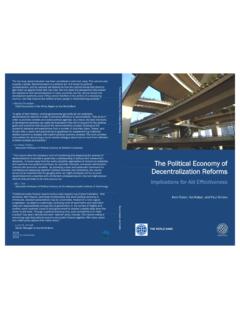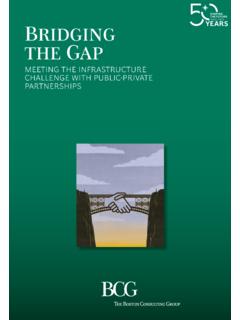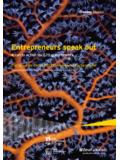Transcription of The Opportunities of Digitizing Payments - World Bank
1 The Opportunities of Digitizing Payments How digitization of Payments , transfers, and remittances contributes to the G20 goals of broad-based economic growth, financial inclusion, and women's economic empowerment A report by the World bank Development Research Group, the Better Than Cash Alliance, and the Bill & Melinda Gates Foundation to the G20 Global Partnership for Financial Inclusion. August 28, 2014. Key Findings and Recommendations for Governments by the Bill & Melinda Gates Foundation and the Better Than Cash Alliance Digitizing Payments AND REMITTANCES IS VITAL TO ACHIEVING G20 GOALS. The G20's focus on financial inclusion directly contributes to its core goal of achieving strong, sustainable, and balanced growth. Studies show that broader access to and participation in the financial system can reduce income inequality, boost job creation, accelerate consumption, increase investments in human capital, and directly help poor people manage risk and absorb financial shocks.
2 Strong action on financial inclusion by G20 countries Digital Payments can promote women's economic and other key stakeholders will contribute significantly empowerment by facilitating greater account ownership to key G20 policy objectives by: and asset accumulation and increasing women's Spurring broader and stronger economic growth, by economic participation. Digital Payments , particularly deepening financial intermediation and increasing by governments and employers, enable the confidentiality efficiency of and access to payment, savings, insurance, and convenience women require in financial services. and credit services. Payments provided via an account can provide the on-ramp to financial inclusion and in many cases the first account Increasing life Opportunities and economic benefits that a woman has in her own name and under her control.
3 For migrant and diaspora communities, by enabling a Opening an account can be an important first step for sharp reduction of costs and increased transparency of introduction to the formal economy for an entrepreneur remittances. and can lead to formalization of her small business. Increasing women's economic participation, by facilitating greater control over finances, household incomes, and While the Opportunities abound, so do the challenges. budget decisions. There are real and complex barriers for governments to address through vision and leadership. Governments must Rapid development and extension of digital platforms address regulatory concerns, work with the private sector and digital Payments can provide the speed, security, to develop infrastructure that can reach rural areas, and transparency, and cost efficiency needed to increase financial ensure interoperability and competition among providers inclusion at the scale required to achieve G20 goals.
4 And financial capability among their citizens. There is also In 2010, the G20 endorsed Principles for Innovative Financial a real and growing momentum on the part of governments, Inclusion to provide guidance for policy and regulatory the private sector, multilateral development banks, and approaches (G20, 2010). This paper builds on that guidance, development partners in this direction, but with billion synthesizing the evidence that the widespread adoption of people still outside the formal financial system, there is an digital Payments in all their forms, including international urgent need for these issues to be more prominent in the and domestic remittances, can be instrumental in reaching agenda of governments. the goals of the G20: In the short term, we call on governments, when they meet Digitizing helps overcome the costs and physical in November 2014 at the G20 Brisbane Summit, to discuss barriers that have beset otherwise valuable financial how they can embrace a broad-based digital financial inclusion efforts.
5 System as a path to growth, greater participation of women Digital platforms offer the opportunity to rapidly scale in the economy, and greater access to Payments , including up access to financial services using mobile phones, retail remittances. point of sales, and other broadly available access points, when supported by an appropriate financial consumer protection framework. 2 | The Opportunities of Digitizing Payments We encourage Turkey to carry forward the good work that Australia has begun within the Global Partnership on Financial Inclusion (GPFI) on these issues, particularly with their work on remittances, markets, and Payments . By the end of the 2015 G20 Summit hosted by Turkey, we call on governments to make progress and report back on the following steps: 1.
6 D. igitize their Payments and receipts, including social private-sector growth. Yet governments need to offer a transfers. Digitizing has the potential to dramatically clear vision and tangible incentives in order to ensure that reduce costs, increase efficiency and transparency, help build the private sector is an effective, competitive, transparent, the infrastructure, and broaden familiarity with digital and efficient partner. Part of this requires that a level Payments . When governments shift their social, salary, and playing field be set up, whereby governments do not create procurement Payments and taxation and licensing receipts disproportionate hurdles for a broad and growing range to electronic form, it creates a foundation upon which the of providers to participate in the global financial system.
7 Private sector and person-to-person Payments , such as Limiting innovation and competition will ultimately lead international and domestic remittances, can build. to noncompetitive solutions in the market and reduce the 2. E. ngage actively on the regulatory agenda. Some availability of reliable, safe, and secure financial systems. regulators are still hesitant to embrace the digital financial Empowering a diverse range of private-sector providers revolution that is emerging, and have reasonable concerns will increase competition, reduce costs, empower that need to be specifically addressed. Governments need to consumers, increase the scale needed for sustainability, encourage regulators to enable digital financial services in and drive financial inclusion.
8 Order to achieve G20 goals. Specifically, regulation should: 5. G. uide digital financial service providers to educate Foster competition by enabling a broad range of consumers and small businesses about their options providers to introduce new vectors of financial services. to increase confidence, competence, and adoption. Recipients should understand, for example, how the cash- Ensure that consumer protection and risk-based transfer program works, the importance of PIN numbers, prudential and integrity requirements are met. what to do if something goes wrong, and how they can Address the cost of entry and encourage business model save some or all of the payment rather than withdrawing innovation for e-money issuers, retail agents, and account all of it upon receipt.
9 Without this, there is a risk that opening processes. recipients could lose trust in the system, and financial Encourage new business models to address the critical inclusion objectives would not be achieved. Evidence concerns that confront regulators, including anti-money indicates that consumers and small businesses rapidly laundering and counter financing of terrorism (AML/ learn how to be competent and comfortable in using these CFT). The Financial Action Task Force (FATF) has systems when they are appropriately designed, convenient, issued guidelines that address these concerns, and many and efficient. countries are successfully implementing the guidelines. 6. R. ecognize the role of remittance providers in offering Brazil's approach, with mobile Payments regulations a digital entry point to formal financial services for that allow nonbanks to offer Payments and savings senders and receivers.
10 This means family members who and to directly access the central bank 's clearing and are sending international and domestic remittances can settlement system, is paving the way for a number of send more money home. Instead of remittances being new commercial partnerships to go to market. Mexico's cashed out, remittances sent to a bank account, e-wallet, or approach of tiered know-your-customer regulations is smart card, for example, can go into accounts that support providing more flexibility for private-sector providers safe saving and also increase transparency and traceability. who participate in the distribution of government 7. Look to multilateral development banks and comparable Payments , and enabling the development of new product agencies as sources of comparative expertise in this design.

















